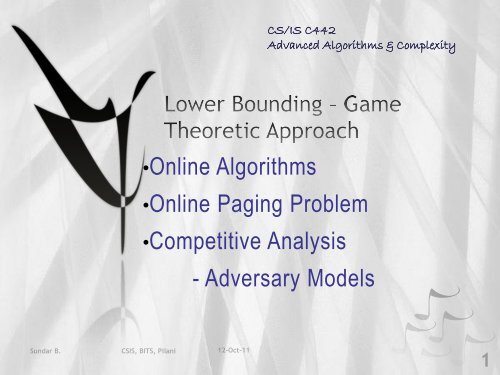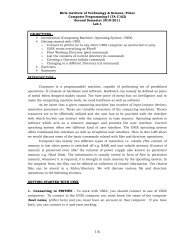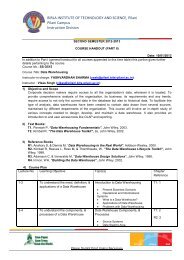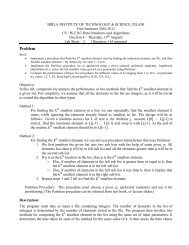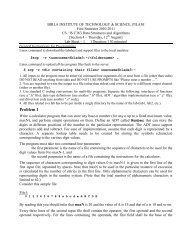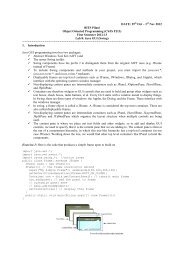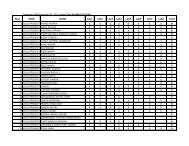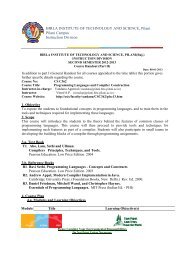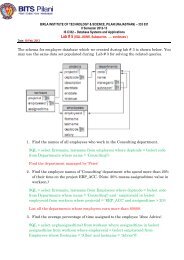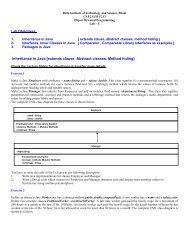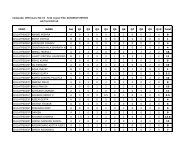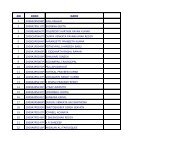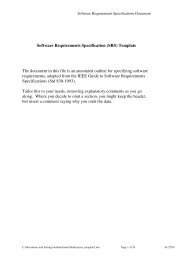Complexity of Online Algorithms - CSIS
Complexity of Online Algorithms - CSIS
Complexity of Online Algorithms - CSIS
Create successful ePaper yourself
Turn your PDF publications into a flip-book with our unique Google optimized e-Paper software.
CS/IS C442<br />
Advanced <strong>Algorithms</strong> & <strong>Complexity</strong><br />
•<strong>Online</strong> <strong>Algorithms</strong><br />
•<strong>Online</strong> Paging Problem<br />
•Competitive Analysis<br />
- Adversary Models
<strong>Online</strong> <strong>Algorithms</strong><br />
<strong>Online</strong> vs. Offline algorithms<br />
• Offline algorithms receive all their inputs at one time.<br />
• <strong>Online</strong> algorithms receive and process their inputs in<br />
partial amounts<br />
e.g. Sorting<br />
• Quick Sort is an <strong>of</strong>fline sorting algorithm while Insertion<br />
Sort is an online sorting algorithm<br />
• Why?
Paging Problem<br />
Consider a 2 level memory hierarchy in a computer<br />
system<br />
• a fast – therefore expensive – therefore small –<br />
memory M 0<br />
• a slow – therefore inexpensive – therefore large –<br />
memory M 1<br />
Assume that each level is divided into units <strong>of</strong> exchange<br />
known as pages<br />
• Let M 0 have k pages and M 1 have at least k+1 pages<br />
When a page is to be used by the processor, it is brought<br />
in from M 1 to M 0 if it is not already available<br />
• If no free slot is available in M 0 then one <strong>of</strong> the existing<br />
pages have to be replaced
<strong>Online</strong> Paging Problem<br />
The page to be replaced is decided by a page replacement<br />
algorithm.<br />
The replacement problem is an online problem because<br />
• the inputs i.e. the requested pages are not known<br />
beforehand<br />
Typical (online) algorithms are:<br />
• FIFO<br />
• replace the page that arrived the earliest<br />
• LFU<br />
• replace the page that has been used the least (since its<br />
arrival)<br />
• LRU<br />
• replace the page that has not been used for the longest<br />
time
Paging <strong>Algorithms</strong><br />
Typical performance parameters for paging algorithms<br />
include<br />
• Time complexity<br />
• time taken to make a decision<br />
• Space complexity<br />
• space used for meta data that is required for making<br />
a decision<br />
• Miss rate<br />
• the number <strong>of</strong> times a request for a page is not<br />
found in M 0 (i.e. is missed and therefore has to be<br />
brought in from M 1 )<br />
We will analyze miss rates <strong>of</strong> paging algorithms
Paging <strong>Algorithms</strong> – Miss Rates<br />
Given a sequence <strong>of</strong> page requests = 0 , 1 , ... n<br />
denote<br />
• the worst case number <strong>of</strong> misses by a specific paging<br />
algorithm A as f A () and<br />
• the worst case number <strong>of</strong> misses by an optimal <strong>of</strong>fline<br />
algorithm as f OPT ()<br />
The following is an optimal <strong>of</strong>fline paging algorithm<br />
based on greedy choice<br />
• GreedyPaging:<br />
• Given an input sequence 0 , 1 , ... n<br />
• on a miss replace the page whose next occurrence is<br />
farthest in the sequence<br />
• i.e. distance between the index <strong>of</strong> the current<br />
request and the index <strong>of</strong> occurrence <strong>of</strong> the page to<br />
be replaced is maximum
Paging Algorithm – Miss Rates<br />
Assumptions:<br />
• We will study the steady-state performance i.e. cold misses are<br />
not counted<br />
• Why is this a reasonable assumption?<br />
• We will assume that the size <strong>of</strong> M 1 is k+1 where k >= 2 is the size<br />
<strong>of</strong> M 0<br />
• Why is this a reasonable assumption?<br />
Greedy Paging Lemma:<br />
• GreedyPaging is optimal and f OPT ([ 0 , 1 , ... n ]) = n / k<br />
• Pro<strong>of</strong> :<br />
• On a miss, the page to be replaced is the one that is farthest<br />
in the sequence (from the current request)<br />
• i.e. in the worst case at least k requests can be handled<br />
before a replacement is required;<br />
• so, one <strong>of</strong> every k requests will be a miss in the worst case.
Paging Algorithm – Miss Rates<br />
<strong>Online</strong> Paging Lemma:<br />
• For any deterministic online algorithm A there exist<br />
sequences <strong>of</strong> arbitrary length such that A misses on<br />
every request<br />
• i.e. f A ([ 0 , 1 , ... n ]) = n<br />
• Pro<strong>of</strong>:<br />
• Consider an adversary who chooses the next input j<br />
to be a page that is not one <strong>of</strong> the k pages in M 0<br />
• Since |M 1 | = k+1, there always exists one such page.<br />
Implication:<br />
• Worst case analysis is not useful in comparing these<br />
algorithms
Paging Algorithm – Competitive Analysis<br />
Definition:<br />
• A deterministic online page replacement algorithm A is<br />
said to be C-competitive if there exists a constant b such<br />
that on every sequence <strong>of</strong> requests = 0 , 1 , ... n ,<br />
• f A () – C * f OPT () = k<br />
• Pro<strong>of</strong>:<br />
• By GreedyPaging Lemma and <strong>Online</strong> Paging Lemma
Paging Algorithm – Competitive Analysis<br />
Claim:<br />
• C LRU = k<br />
• Pro<strong>of</strong>:<br />
• Partition the input sequence into rounds R 0 , R 1 ... R t<br />
• such that each round R j results in exactly k misses by<br />
LRU.<br />
• In each round R j , all the k+1 pages must have been<br />
accessed.<br />
• Why?<br />
• So, the ratio <strong>of</strong> misses by LRU to optimal misses is at most<br />
k i.e. for any input sequence <br />
• f LRU () / f OPT ()
Paging Algorithm – Competitive Analysis<br />
Claim: C FIFO = k<br />
• Pro<strong>of</strong>: (similar to the pro<strong>of</strong> for LRU: left as exercise)<br />
Claim: C LFU > k<br />
• Pro<strong>of</strong>:<br />
• Consider a sequence where<br />
• 0 , 1 , ... j are k-1 distinct pages with 2 accesses<br />
each and<br />
• j+2*i-1 , j+2*i are a pair <strong>of</strong> different pages repeated<br />
for each i = 1, 2, ...<br />
• and are different from 0 , 1 , ... j<br />
• f LFU () = n – 2*k + 1 and f OPT () = 2<br />
• Therefore the ratio f LFU () / f OPT () is O(n)<br />
• i.e. not bounded
Paging Algorithm – Competitive Analysis<br />
<strong>Online</strong> Paging Competitiveness Theorem:<br />
• For any deterministic online algorithm A for paging, C A >= k<br />
• Alternative Pro<strong>of</strong>:<br />
• Imagine that the online algorithm A and the optimal<br />
algorithm O are managing separate caches with the same<br />
initial set <strong>of</strong> items for the same request sequence<br />
• The first request is to an item not in either cache<br />
• Both algorithms incur a miss<br />
• Let S = { the new item } U { all items initially in O’s cache}<br />
• Every new request is for an item not in A’s cache<br />
• A misses on every request<br />
• Split the request sequence into rounds :<br />
• a round is a maximal sequence <strong>of</strong> requests in which at most<br />
k distinct items are requested<br />
• i.e. in each round A misses at least k times but O misses<br />
exactly once (the first request in each round, which would<br />
have been O’s victim for the first request <strong>of</strong> the previous<br />
round)
Paging Algorithm – Competitive Analysis<br />
<strong>Online</strong> Paging Competitiveness Theorem:<br />
• For any deterministic online algorithm A for paging, C A >= k<br />
• Alternative Pro<strong>of</strong> (contd.)<br />
• At the end <strong>of</strong> each round both A and O have the same<br />
set <strong>of</strong> items in their caches<br />
• i,e. there are arbitrarily long sequences on which A has k<br />
times as many misses as O<br />
Pro<strong>of</strong> Technique:<br />
• We used only the fact that the online algorithm does not<br />
know future requests<br />
• We did not exploit any computational limitation <strong>of</strong> the<br />
online algorithm<br />
Thus the lower bound applies to any deterministic online<br />
algorithm regardless <strong>of</strong> space and time complexities
Paging Algorithm – Competitive Analysis<br />
<strong>Online</strong> Paging Competitiveness Theorem:<br />
• For any deterministic online algorithm A for paging, C A >= k<br />
Question:<br />
• Can the negative result in OPC Theorem be overcome<br />
using randomization?<br />
Pro<strong>of</strong> Technique:<br />
• One can view the <strong>of</strong>fline algorithm as an adversary who is<br />
not only managing a cache but is also choosing the inputs<br />
• and in this case an adversary who also knows the state <strong>of</strong><br />
the algorithm (being analyzed).<br />
• In case <strong>of</strong> a randomized algorithm, if the adversary knows<br />
the state (in this case, current set <strong>of</strong> pages in the cache)<br />
• then the adversary knows the random choices made by<br />
the algorithm (in this case, the pages to be evicted)
Adversary Models<br />
There are different models for such an adversary<br />
• An oblivious adversary<br />
• is an adversary who does not know the random choices<br />
made by the algorithm<br />
• An adaptive adversary<br />
• is an adversary who gets to know the random choices<br />
made by the algorithm<br />
• and therefore gets to choose the next input based on<br />
the current choice<br />
An adaptive adversary may choose<br />
• to generate all the inputs and then execute its own<br />
algorithm (referred to as an adaptive <strong>of</strong>fline adversary)<br />
OR<br />
• to execute its own algorithm as it generates its inputs<br />
(referred to as an adaptive online adversary)<br />
Question:<br />
• Why does this choice not matter for an oblivious adversary?
Competitiveness <strong>of</strong> Randomized <strong>Algorithms</strong><br />
A randomized online paging algorithm R would make a<br />
– possibly random – choice <strong>of</strong> which <strong>of</strong> the k items in the<br />
cache it will evict:<br />
• Given a sequence <strong>of</strong> requests the number <strong>of</strong> misses is<br />
now a random variable, say, f R ()<br />
• Then R is C-competitive against the oblivious<br />
adversary if for every sequence <strong>of</strong> requests<br />
E[f R ()] – C * f OPT ()
Competitiveness <strong>of</strong> Randomized <strong>Algorithms</strong><br />
Given a randomized online paging algorithm R and a<br />
sequence <strong>of</strong> requests generated by an adaptive <strong>of</strong>fline<br />
adversary<br />
• Let the number <strong>of</strong> misses by R be denoted by the random<br />
variable f R ()<br />
• Let the number <strong>of</strong> misses by the optimal <strong>of</strong>fline algorithm be<br />
denoted by the random variable f OPT (R)<br />
• Question: Why is this a random variable?<br />
• Then R is C-competitive against the adaptive <strong>of</strong>fline<br />
adversary if for every sequence <strong>of</strong> requests<br />
• E[f R ()] – C * E[f OPT ()]
Competitiveness <strong>of</strong> Randomized <strong>Algorithms</strong><br />
Given a randomized online paging algorithm R and a<br />
sequence <strong>of</strong> requests generated by an adaptive <strong>of</strong>fline<br />
adversary<br />
• Let the number <strong>of</strong> misses by R be denoted by the<br />
random variable f R ()<br />
• Let the number <strong>of</strong> misses by the optimal online<br />
algorithm be denoted by the random variable<br />
f OPTON (R)<br />
• Then R is C-competitive against the adaptive <strong>of</strong>fline<br />
adversary if for every sequence <strong>of</strong> requests<br />
• E[f R ()] – C * E[f OPTON ()]
Competitiveness <strong>of</strong> Randomized <strong>Algorithms</strong><br />
Clearly, by definition, for any randomized algorithm R,<br />
• C R<br />
obl<br />
Paging against an oblivious adversary<br />
Consider an online deterministic paging algorithm A<br />
• Let p be a probability distribution for choosing a request<br />
sequence<br />
• i.e. a distribution for choosing i (which may depend on<br />
i1 , i2 , ... , i-1 )<br />
• Both A’s cost and the optimal cost are now random<br />
variables.<br />
• Define A’s competitiveness coefficient under p , denoted<br />
C A<br />
p<br />
, to be the smallest C such that<br />
E[f R ()] – C * E[f OPT ()]
Paging against an oblivious adversary<br />
Also note that C R<br />
obl<br />
can be interpereted as<br />
• max { smallest C such that E[f R ()] – C * f OPT () = min A C A<br />
p<br />
• i.e. for any distribution p and any algorithm R<br />
• C R<br />
obl<br />
>= min A C A<br />
p
Paging against an oblivious adversary<br />
Theorem:<br />
• Let R be a randomized online algorithm for paging. Then<br />
C R<br />
obl<br />
>= H k where H k is k th Harmonic number.<br />
Pro<strong>of</strong>:<br />
• We will use Yao’s minimax principle i.e.<br />
• we will choose a probability distribution and<br />
• find the best performance for it by a deterministic online<br />
algorithm<br />
• which will be the lower bound for the performance <strong>of</strong> any<br />
randomized online algorithm<br />
• Let I = { I 1 , I 2 , ..., I k+1 } be the set <strong>of</strong> possible pages to be<br />
requested.<br />
• We will construct a probability distribution p on request<br />
sequences <strong>of</strong> length N >= k<br />
• and prove that for p the best expected performance by a<br />
deterministic online algorithm is H k .
Paging against an oblivious adversary<br />
Pro<strong>of</strong> (contd.):<br />
• Construction <strong>of</strong> a distribution p on request sequences :<br />
• the first request 1 is chosen uniformly randomly from the<br />
items in I<br />
• for i > 1, request i is chosen uniformly randomly from the<br />
items in I – { i-1 }<br />
• Divide the sequence into rounds:<br />
• each round is made <strong>of</strong> a maximal subsequence containing<br />
requests <strong>of</strong> k distinct pages<br />
• Claims:<br />
1. The expected length <strong>of</strong> such a round is k*H k<br />
2. For each round, the optimal <strong>of</strong>fline algorithm would miss<br />
once.<br />
3. The expected number <strong>of</strong> misses per round by the best<br />
deterministic online algorithm, is H k<br />
• By Claims 2 and 3, min A C A<br />
p<br />
= H k
Paging against an oblivious adversary<br />
Claim 1:<br />
• The expected length <strong>of</strong> a round is kH k<br />
Pro<strong>of</strong>:<br />
• Consider a complete graph G with k+1 vertices.<br />
• Assume that a person walking along (the edges <strong>of</strong>) G<br />
chooses any neighbor with equal probability (1/k in<br />
this case)<br />
• What is the expected number <strong>of</strong> steps before a<br />
person starting at a vertex ends up visiting every<br />
vertex at least once?<br />
• (Random Walks) Cover Time for a Complete<br />
Graph with n nodes is n-1 H n-1<br />
• We will study Random Walks later.
Paging against an oblivious adversary<br />
Claim 2:<br />
• For each round, the optimal <strong>of</strong>fline algorithm would<br />
miss once<br />
Pro<strong>of</strong>:<br />
• Each round includes requests for k distinct pages.<br />
• So the greedy optimal algorithm would retain those<br />
k pages in cache.<br />
• The first request in each round would be an item not<br />
in cache<br />
• and hence the optimal algorithm would incur a<br />
miss on that.
Paging against an oblivious adversary<br />
Claim 3:<br />
• The expected number <strong>of</strong> misses per round by the best<br />
deterministic online algorithm, say A, is H k<br />
Pro<strong>of</strong>:<br />
• At any point in time, A must leave one <strong>of</strong> the k+1 items<br />
out <strong>of</strong> the cache.<br />
• Whenever a request falls on this item, A incurs a miss<br />
• In distribution p, every request is chosen uniformly<br />
randomly from the k items other than the last<br />
requested item<br />
• The probability that a request falls on the item left<br />
out by A is 1/k.<br />
• The expected number <strong>of</strong> misses on a round <strong>of</strong> length<br />
kH k is then H k
<strong>Online</strong> Paging - Marker Algorithm<br />
The marker algorithm<br />
• maintains a marker bit with each cache location<br />
• and proceeds in a series <strong>of</strong> rounds.<br />
For each round:<br />
• At the beginning, all marker bits are set to 0.<br />
• For each request:<br />
• if the item is in a cache location, then the corresponding<br />
marker is set to 1<br />
• if the item is a miss<br />
• choose an unmarked cache location, u, uniformly<br />
randomly<br />
• evict the item in u and set its marker to 1<br />
• bring the requested item into u<br />
• If all locations are marked, the round ends.
<strong>Online</strong> Paging - Marker Algorithm<br />
Theorem: The Marker algorithm is (2H k )-competitive.<br />
Pro<strong>of</strong>:<br />
• (By comparing the Marker algorithm’s performance<br />
against the optimal <strong>of</strong>fline algorithm on the same<br />
sequence <strong>of</strong> inputs)<br />
• The Marker algorithm implicitly divides the request<br />
sequence into rounds such that<br />
• there are exactly k distinct items in each round<br />
• Define an item to be<br />
• stale – if is unmarked (in this round) but was marked<br />
in the previous round<br />
• clean – if it is neither stale nor marked<br />
• Let L be the number <strong>of</strong> requests to clean items in a<br />
round.
<strong>Online</strong> Paging - Marker Algorithm<br />
Theorem: The Marker algorithm is (2H k )-competitive.<br />
Pro<strong>of</strong> (continued):<br />
• Claims:<br />
• The amortized number <strong>of</strong> misses per round by the<br />
<strong>of</strong>fline algorithm is at least L/2<br />
• The expected number <strong>of</strong> misses per round by the<br />
Marker algorithm is L*H k<br />
• So, the competitive ratio is 2*H k .
Paging against an oblivious adversary<br />
Compare the results <strong>of</strong> the previous two theorems i.e.<br />
• C R<br />
obl<br />
>= H k for any randomized algorithm R and<br />
• C M<br />
obl<br />
= 2*H k for the M(arker) algorithm<br />
with that <strong>of</strong> the lower bound result for deterministic<br />
algorithms:<br />
• C A >= k for any deterministic algorithm A<br />
How do you interpret the results?
Relating the Adversaries<br />
How do randomized online paging algorithms compete<br />
against adaptive adversaries?<br />
Theorem (without pro<strong>of</strong>): [applicable for a general class<br />
<strong>of</strong> request-answer problems including paging]<br />
• If there is a randomized algorithm that is -competitive<br />
against every adaptive <strong>of</strong>fline adversary, then there<br />
exists an -competitive deterministic algorithm.<br />
Implication (for paging):<br />
• There is no randomized online algorithm for paging<br />
with a competitiveness coefficient smaller than k.
Relating the Adversaries<br />
Theorem (without pro<strong>of</strong>): [applicable for a general class<br />
<strong>of</strong> request-answer problems including paging]<br />
• If there is a randomized algorithm R that is -<br />
competitive against every adaptive online adversary,<br />
and there is a -competitive randomized algorithm<br />
against any oblivious adversary then R is (*) –<br />
competitive any adaptive <strong>of</strong>fline adversary.<br />
Implication (for paging): ??


